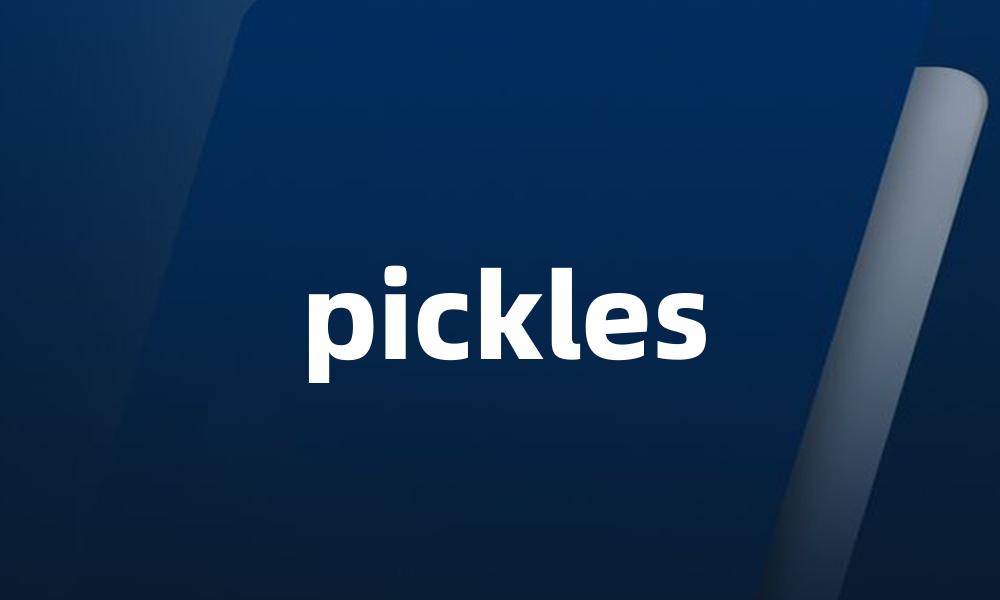
pickles
名词
1. 酸菜;泡菜 - 英文释义:vegetables or fruit that have been preserved in vinegar or salt water, especially cucumbers. - 例句: 1. I love eating pickles with my sandwiches.(我喜欢在三明治里放酸菜。) 2. She makes her own pickles using her grandmother's recipe.(她用她祖母的食谱自制酸菜。) 2. 困境;难题 - 英文释义:a difficult or messy situation. - 例句: 1. We found ourselves in a pickle when our car broke down in the middle of nowhere.(我们的车在荒无人烟的地方抛锚,陷入了困境。) 2. How did you manage to get out of that pickle?(你是如何解决那个难题的?) 3. 糟糕的东西;烂摊子 - 英文释义:something that is in a poor or bad condition. - 例句: 1. The house was a pickle after the party.(派对结束后,房子一片狼藉。) 2. The project turned into a real pickle when the main contractor pulled out.(当主承包商退出时,这个项目变成了一团糟。)形容词
1. 酸的;咸的 - 英文释义:having a sharp, sour, or salty taste. - 例句: 1. These pickles are too salty for my liking.(这些酸菜太咸了,我不喜欢。) 2. The pickled onions have a tangy and sour flavor.(腌制的洋葱有一种浓郁的酸味。)词语辨析
- 英文释义:pickles, preserves, and relishes are all types of food that have been preserved or pickled in some way. Pickles are vegetables or fruit preserved in vinegar or salt water. Preserves are sweet foods made by cooking fruit with sugar, often in the form of jam or jelly. Relishes are sauces or pickles with a spicy or piquant flavor, typically eaten with savory food. - 例句: 1. She served a variety of pickles, preserves, and relishes with the cheese platter.(她在奶酪拼盘上搭配上了各种腌制品、果酱和调味品。)词汇扩充
- 英文释义:pickling, pickled, pickler, pickly. - 例句: 1. The pickling process gives the vegetables a tangy flavor.(腌制过程赋予了蔬菜一种浓郁的口味。) 2. He enjoyed snacking on pickled onions.(他喜欢吃腌制的洋葱作为零食。)近义词
- 英文释义:preserves, relish, chutney. - 例句: 1. I prefer relish to pickles on my hamburgers.(我更喜欢在汉堡里放调味酱,而不是酸菜。) 2. The chutney served with the curry added a spicy kick to the dish.(搭配咖喱的酸辣酱给菜肴增添了一抹辣味。)反义词
- 英文释义:fresh, unprocessed. - 例句: 1. I prefer fresh cucumbers over pickles.(我更喜欢新鲜的黄瓜而不是酸菜。) 2. She likes unprocessed foods and avoids anything pickled.(她喜欢未经加工的食物,不吃任何腌制品。)柯林斯词典
名词 1. 酸菜;泡菜 形容词 1. 酸的;咸的牛津词典
名词 1. 酸菜;泡菜 动词 1. 腌制(食物)用法
- 英文释义:Pickles can be used as both a noun and a verb. As a noun, it refers to preserved vegetables or fruit. As a verb, it means the process of preserving food by soaking it in vinegar or salt water. - 例句: 1. She bought a jar of pickles from the store.(她从商店买了一罐酸菜。) 2. He pickles his own cucumbers every summer.(他每年夏天都自己腌制黄瓜。)例句
- I love eating pickles with my sandwiches.(我喜欢在三明治里放酸菜。)
- She makes her own pickles using her grandmother's recipe.(她用她祖母的食谱自制酸菜。)
- We found ourselves in a pickle when our car broke down in the middle of nowhere.(我们的车在荒无人烟的地方抛锚,陷入了困境。)
- How did you manage to get out of that pickle?(你是如何解决那个难题的?)
- The house was a pickle after the party.(派对结束后,房子一片狼藉。)
- The project turned into a real pickle when the main contractor pulled out.(当主承包商退出时,这个项目变成了一团糟。)
- These pickles are too salty for my liking.(这些酸菜太咸了,我不喜欢。)
- The pickled onions have a tangy and sour flavor.(腌制的洋葱有一种浓郁的酸味。)
- She served a variety of pickles, preserves, and relishes with the cheese platter.(她在奶酪拼盘上搭配上了各种腌制品、果酱和调味品。)
- The pickling process gives the vegetables a tangy flavor.(腌制过程赋予了蔬菜一种浓郁的口味。)
- He enjoyed snacking on pickled onions.(他喜欢吃腌制的洋葱作为零食。)
- I prefer relish to pickles on my hamburgers.(我更喜欢在汉堡里放调味酱,而不是酸菜。)
- The chutney served with the curry added a spicy kick to the dish.(搭配咖喱的酸辣酱给菜肴增添了一抹辣味。)
- I prefer fresh cucumbers over pickles.(我更喜欢新鲜的黄瓜而不是酸菜。)
- She likes unprocessed foods and avoids anything pickled.(她喜欢未经加工的食物,不吃任何腌制品。)
- She bought a jar of pickles from the store.(她从商店买了一罐酸菜。)
- He pickles his own cucumbers every summer.(他每年夏天都自己腌制黄瓜。)

 小皮
小皮